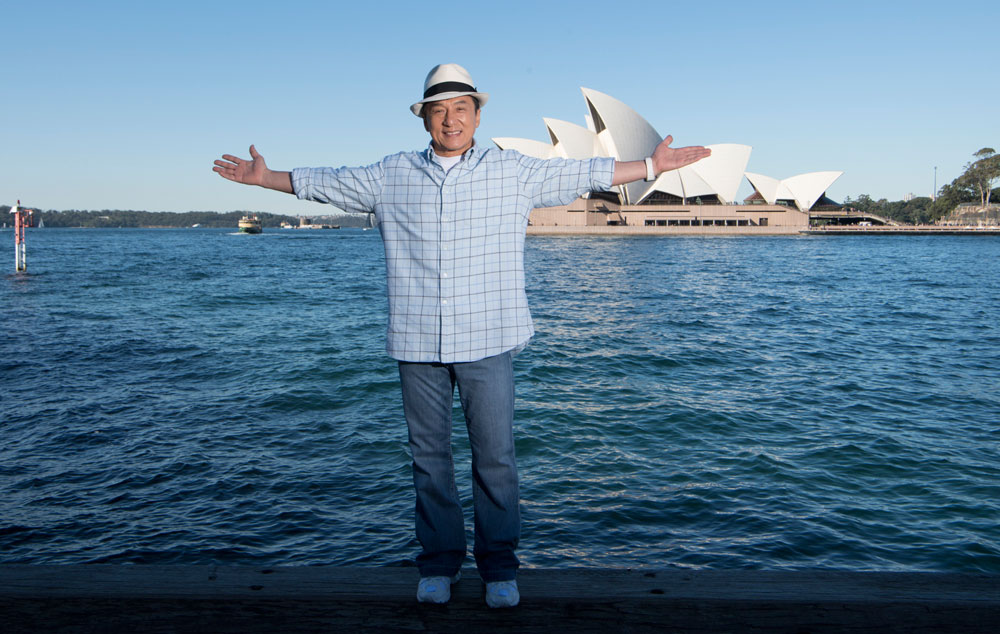Australia and China “natural partners”
Bleeding Steel actor Jackie Chan and Village Roadshow Asia CEO Ellen Eliasoph share their advice for Australian filmmakers wanting to work with China.
 Jackie Chan in Sydney
Jackie Chan in Sydney
Jackie Chan’s latest film Bleeding Steel has begun filming in Australia, but it actually marks the second Chinese movie to shoot on our shores this year – collaborations that the head of Village Roadshow Asia has deemed “a match made in heaven”.
In February, Australia-Chinese co-production Nest wrapped on the Gold Coast, while sci-fi/action movie Bleeding Steel has kicked off production in Sydney, with additional filming to take place in Taipei and Beijing.
Ellen Eliasoph, the CEO and President of Village Roadshow Entertainment Group Asia, says Australia’s locations and wealth of filmmaking talent are a real drawcard for Chinese filmmakers wanting to fully realise their creative and ambitious visions.
“We’ve discovered that the Chinese and Australian film industries have amazing synergies and are in fact natural partners for global filmmaking,” Eliasoph said at a press conference for Bleeding Steel.
“Australia has a stunning variety of locations and its filmmakers have world class skills in all the disciplines of filmmaking.
“The industry is looking to deploy these capabilities and assets in the context of bigger films that will reach China’s booming market and around the world.”
Eliasoph says this collaboration is clear in Bleeding Steel.
“We believe this will be a ground-breaking film that will serve as a milestone in the course of China-Australia film co-operation,” she says.
China’s film industry is booming. In the first quarter of 2016, revenues from Chinese mainland cinemas were up by 50% and it’s been well-documented that China is expected to overtake the US as the world’s biggest movie market.
But as Eliasoph notes, they are still a young filmmaking country and keen to partner with overseas creatives who can bring their experience and fresh ideas to the table.
Producer and actor Jackie Chan says it starts with having a quality script that speaks to the Chinese market.
“Everything used to be ‘write about America, how I go to America’. Right now (write about) how an Australian actor and Chinese actor, starts from Australia and how they go to China. This kind of script is good for the filmmaker in Australia,” he says.
Chan says he recently finished a British-Chinese collaboration called Civilian, as well as Indian-Chinese collaboration Kung-Fu Yoga.
A new collaboration with America, Skiptrace starring Chan and Johnny Knoxville, recently released in China and topped the box office over its first weekend with US$60m in just four days.
But Eliasoph warns any filmmaker wanting to work with China, not just Australians, that Chinese writers, producers, or companies need to be involved from an early development stage.
“If you’re really aiming your stories at a Chinese audience, you have to understand what their film viewing habits are, what touches them and what makes them laugh. And it’s going to be different from a Hollywood movie,” she tells The Screen Blog.
“They need from the outset to have that story incorporate the Chinese DNA of filmmaking.
“You can’t just finish a script and drop it into China and think that people are going to respond to it… and you can’t just dust off a script that’s been sitting on the shelf for five years unproduced and change some of the characters to make them Chinese, or change some of the cities to be Chinese cities, when they were written originally with a different setting and different culture in mind.
“It’s not that easy.
“It’s not a process of translation. It’s a process of creation from the get-go.”
For more information on Official Co-Productions such as Nest, click here

What to read next
The Australian Directors Guild (ADG) and Screen Australia today announced a director’s attachment for Ridley Scott’s upcoming feature Alien: Covenant that is filming in Australia in 2016.
08 Feb 2016
Screen Australia